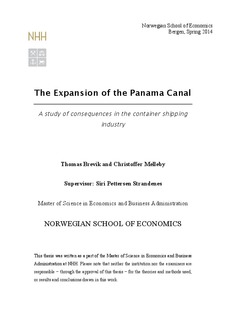The expansion of the Panama canal : a study of consequences in the container shipping industry
Master thesis
Permanent lenke
http://hdl.handle.net/11250/222775Utgivelsesdato
2014Metadata
Vis full innførselSamlinger
- Master Thesis [4372]
Sammendrag
The Panama Canal has become a constraining factor on trade across the Pacific and
Atlantic Ocean, and the expansion of the Canal is expected to have a positive
influence on world trade. Our research investigates the competitiveness of the Panama
Canal in the container shipping industry and the possible macroeconomic
consequences of the canal expansion.
We have designed a model that compares costs and earnings for single voyages and
round-trips, and with a basis in opportunity cost theory we compare the Panama Canal
with alternative routes and analyze the sensitivity of key variables for different
scenarios. From our analyses we see that the current bunker price forces vessels to
slow-steam to maintain profits. This has led shipowners to prioritize cost savings at
the expense of fewer annual voyages. Simultaneously, operators in the container
industry are constantly seeking to exploit large-scale advantages and we find strong
evidence that the unit cost and the size of vessels are inversely proportional. This has
led to a relentless upsizing of container vessels, and our calculations suggest that the
expanded Panama Canal will face competition from the Ultra-Large Container Vessel
segment. Further, our findings suggest that the current Panama Canal toll system with
a constant price per TEU transited will not be applicable when opening for Post-
Panamax vessels. Therefore, the Panama Canal toll system should be adjusted to
facilitate for economies of scale in order for the Canal to stay competitive with
alternative routes.
As the world shipping market is still adjusting after the financial crisis in 2008, the
expansion comes at an interesting point in time and the possible consequences are
multidimensional. Our research suggests that the effects can be both positive and
negative for shipowners depending on whether the expansion leads to an increase in
tradable volume or a shift in existing trade.
